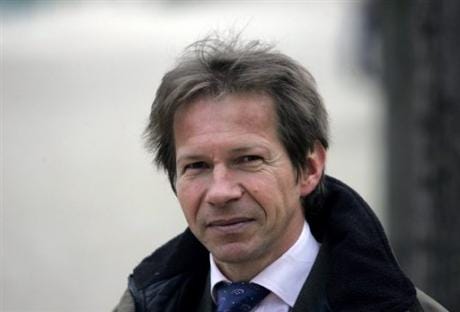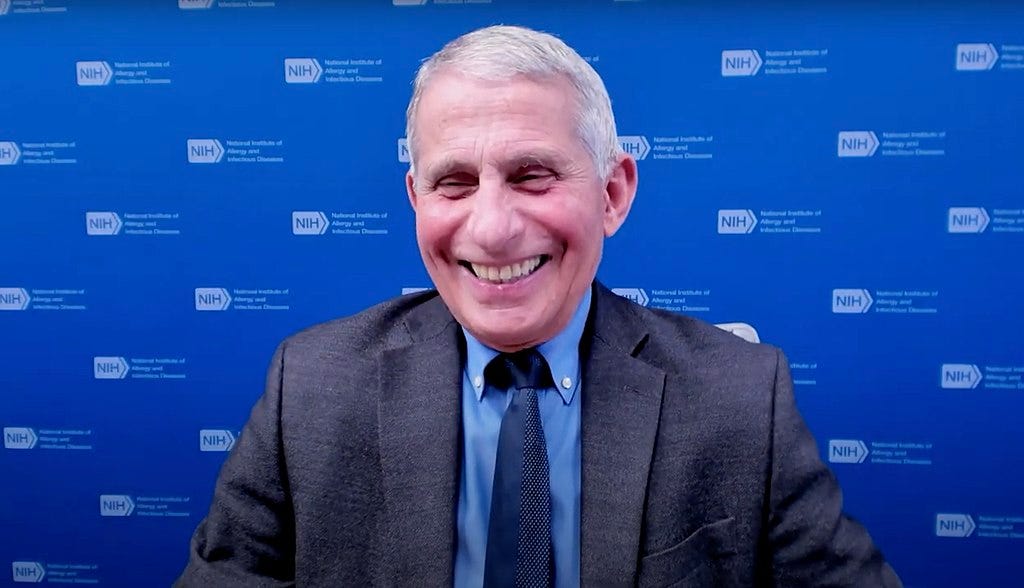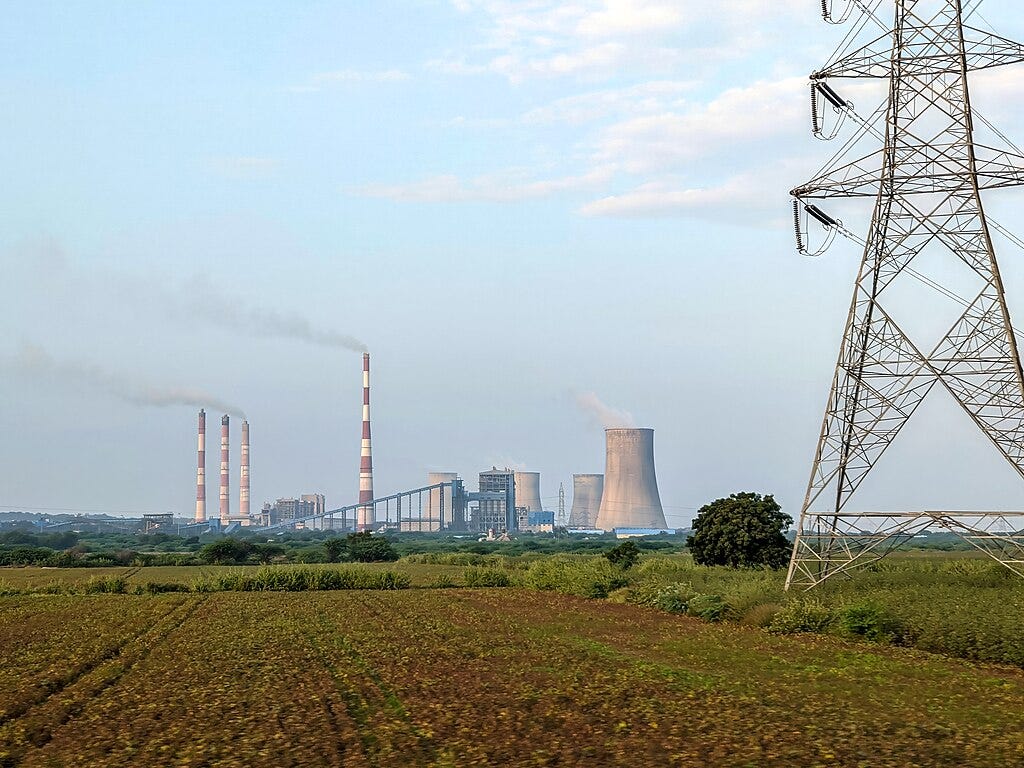News Round-Up: French Climate Expert Criticises Renewable Energy, Harassment of Press in Canada and Unscientific Basis of Covid Measures
Every week, the editorial team of Freedom Research compiles a round-up of news that caught our eye, or what felt like under-reported aspects of news deserving more attention.
Over the past week, the following topics attracted our attention:
French government's climate advisor: renewable energy makes economic growth impossible.
Anthony Fauci in front of the US Congress: social distancing rules lacked scientific basis.
Canada's press freedom situation: police arrest reporter who questions the minister.
India plans to double its coal mining operations.
Well-known car-hire company drops electric cars: 'Costs too high'.
French government's climate advisor: renewable energy makes economic growth impossible
According to Jean-Marc Jancovici, an influential French energy and climate expert and member of the commission that advises the French government on climate issues, wind, solar and hydropower do not offer miracle solutions to enable the preservation of the modern industrial world, reports The Telegraph. Globalisation means ships, trucks, planes, and computers, that all rely on fossil fuels. "The idea that we can keep all that in a world with only renewable energies is a bold assumption and I don’t believe that such a shift is compatible with maintaining growth in physical economic output," he said, adding that the assumption that renewables will remain cheap in a world of just renewables is also unproven. Nuclear energy could be one of the energy sources that could help soften the blow, he said. At the last UN climate summit COP28, 22 countries agreed to triple nuclear power capacity by 2050. According to Jancovici, this can be done, but it is not enough to sustain today's industrial production. Tripling capacity means that the global share of nuclear power in final consumption would rise from 2% to 6%. "It’s a good idea but will not spare us from having to make tremendous efforts on decreasing energy use," Jancovici said.

Jancovici is known for his warnings on greenhouse gases, climate change, and fossil fuel depletion. For example, he has argued that people should not travel by air more than four times in their lifetime to save carbon emissions. He himself has not flown in the last 20 years.
However, Jancovici is not optimistic in his assessment that humanity will indeed reduce carbon emissions at the rate he believes is necessary to avoid rising temperatures. For example, he does not believe that the target of keeping global warming at 1.5 degrees Celsius compared to pre-industrial levels, as set out in the 2015 Paris climate agreement, is achievable. "The probability of keeping to the 1.5 degrees is zero unless a comet hits the earth or there is all-out nuclear war, or a new pandemic more harmful than Covid," Jancovici said. To meet the target, he said, CO2 emissions would have to start falling by 7-8 percent each year immediately. "Seven per cent is India’s share of world emissions. So for the plan to work, India’s emissions would have to disappear next year. In year two, two-thirds of Europe’s need to go. That’s the rate at which things must evolve. Even for two degrees, we would need an extra Covid each year to stay on track," he said.
Anthony Fauci in front of the US Congress: social distancing rules lacked scientific basis
Anthony Fauci, former US presidential adviser on Covid and one of the world's most influential health officials during the pandemic, confirmed that the '6 feet apart' rule that people around the world were forced to follow had no scientific basis. As one of the most ardent proponents of the rule during the Covid crisis, Fauci told a subcommittee of the US House of Representatives assessing the Covid pandemic response this Tuesday that such a rule "sort of just appeared". Fauci acknowledged that the rule was “likely not based on scientific data”.

Fauci also acknowledged at the hearing that the introduction of Covid vaccine mandates in 2021 could increase vaccine hesitancy in the future. Fauci himself was one of the proponents of mandatory vaccination, e.g. advising universities to force Covid vaccines on students.
In addition, Fauci acknowledged that the lab-leak hypothesis is not a conspiracy theory. It is worth recalling that at the beginning of the Covid crisis, Fauci was one of the influential figures who denied this possibility and was keen to show that the virus originated in the wet market in Wuhan, China, and not in a lab in the same city engaged in coronavirus experiments. We have written at length about the realistic laboratory origin possibility of Covid-19 here.
Canada's press freedom situation: police arrest reporter who questions the minister
David Menzies, a reporter for Canada's alternative media outlet Rebel News, was arrested on Monday for trying to ask the country's Deputy Prime Minister Chrystia Freeland a few questions on the street as she arrived for an event. The questions concerned why Canada has not declared the Islamic Revolutionary Guard Corps, part of the Iranian armed forces, a terrorist organisation. This organisation is responsible, among other things, for the shooting down of a passenger plane from the Iranian capital Tehran to the Ukrainian capital Kiev in 2020 immediately after take-off, killing the entire crew and 167 passengers. Sixty-three Canadian citizens were killed on board. The event Freeland was on her way to was intended to commemorate this incident. In any case, Freeland was clearly reluctant to answer the questions, perhaps because she found the questions uncomfortable or because the minister did not consider Rebel News to be a suitable interlocutor.
The publication is notorious for its tactics, such as unexpectedly going to interview someone in a position of political or economic power, on whose decisions the fate of many people depends, but who is not used to answering such critical questions, as reporters traditionally ask them softer questions in agreed interviews. For example, in January last year in Davos, Switzerland, reporters from Rebel News interviewed Albert Bourla on the street. Bourla, the CEO of the pharmaceutical giant Pfizer was attending the World Economic Forum. The questions concerned the poor efficacy of Pfizer's Covid vaccines and their serious side effects. They got no answers from Bourla, who studiously ignored the questioners and tried to move on to his destination and get away from the reporters.
This time, with Freeland, the questioning was prevented by a police officer who deliberately stepped in front of the reporter. When Menzies clashed with the policeman, the policeman accused him of assaulting him, and the reporter was arrested. Rebel News filmed the whole incident.
The video has since gone viral and the police's actions have been condemned by Canadian opposition leader Pierre Poilievre, a Conservative. "This is the state of freedom of the press. In Canada. In 2024. After 8 years of Trudeau," he wrote, sharing the video on the social media platform X, referring to the fact that Prime Minister Justin Trudeau has been in power for eight years. Freeland declined to comment on the behaviour of the police, saying that politicians have no role in the operational decisions of the police.
Menzies was ultimately not charged.
India plans to double its coal mining operations
The Indian government plans to double coal production in the country by 2030 to meet growing demand, Bloomberg reports. According to plans outlined by India's Power Minister Raj Kumar Singh, 88 GW of new thermal power plants will be opened by 2032, most of which will burn coal.
Energy shortages are an ongoing problem for a large and developing India, and power generation is struggling to meet consumption peaks. Therefore, no form of energy production will be abandoned, even though India's representative at the last UN climate conference COP28 in December finally also agreed with the statement to transition away from fossil fuels. However, it was India, China, and South Africa that rejected the proposal that no new coal-fired power plants should be built without built-in carbon capture and storage facilities.

"India's policy is to build everything. Push for renewables, but also push for coal and other fossil fuels,” commented Sandeep Pai, director of Swaniti Global, a climate-focused organisation, on the country's choice. "The justification is an increase in power demand,” he added.
Well-known car-hire company drops electric cars: 'Costs too high'
Hertz, one of the world's largest and best-known car rental companies, plans to sell a third of its electric cars in the United States and reinvest in combustion engine cars. The reasons cited are weak demand for electric cars and high repair costs, Bloomberg reports.
Sales of 20,000 electric cars started in December and will continue through 2024.
“The elevated costs associated with EVs persisted,” Hertz chief executive Stephen Scherr said. “Efforts to wrestle it down proved to be more challenging,” he added.
But how successful the aftermarket sales of electric cars will be is another question. In Europe, for example, it is hard to say whether there is such a thing as an aftermarket for electric cars, according to car dealers, Euractiv reports. The majority of European drivers who buy a second-hand car prefer an internal combustion engine vehicle. In the EU's biggest car market Germany, used electric vehicles account for just 1.58% of the sales and less than 1% in Italy and Spain. One of the reasons why consumers do not buy second-hand electric cars is their higher price compared to petrol and diesel cars.



". . . renewable energy makes economic growth impossible . . . "
It doesn't make "growth" impossible: it makes returning to a Stone Age economy INEVITABLE!